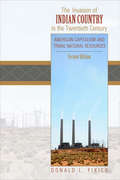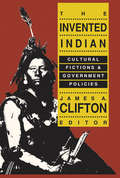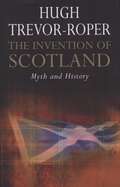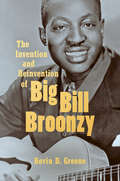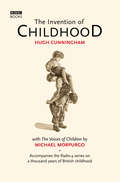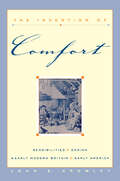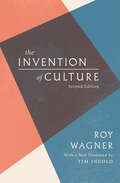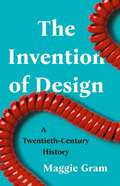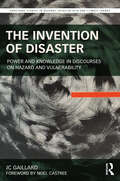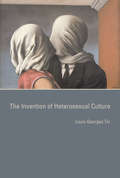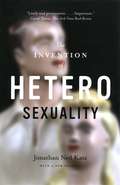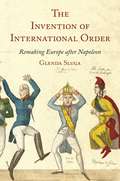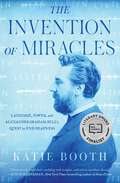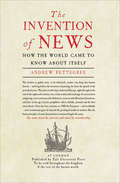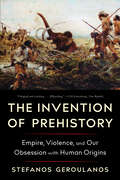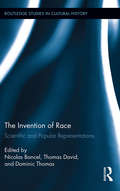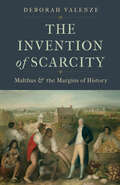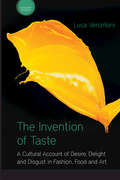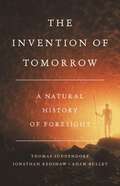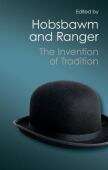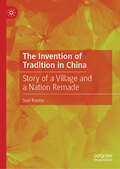- Table View
- List View
The Invasion of Indian Country in the Twentieth Century: American Capitalism and Tribal Natural Resources, Second Edition
by Donald Fixico Donald Lee FixicoThe Invasion of Indian Country in the Twentieth Century, Second Edition is updated through the first decade of the twenty-first century and contains a new chapter challenging Americans--Indian and non-Indian--to begin healing the earth. This analysis of the struggle to protect not only natural resources but also a way of life serves as an indispensable tool for students or anyone interested in Native American history and current government policy with regard to Indian lands or the environment.
The Invented Indian: Cultural Fictions and Government Policies
by James A. CliftonThis is an explosive collection of essays, written by leading scholars of North American Indians, most of them heavily involved in service and applied work, often on behalf of Indian clients, communities, and organizations. In an area saturated with deadening, consciously politicized orthodoxy, these seventeen essays aim at nothing less than the reconstruction of our understanding of the American Indian-past and presentThe volume examines in careful, accurate but uncompromising ways the recent construction of the prevailing conventional story-line about ""America's most favored underclass."" The first eight essays introduce the volume and treat a variety of specific invented traditions concerning Indians. These are followed by four essays on broader, thematic issues related to the demographic, religious, cultural, and kinship elements in Indian studies. The final five chapters express a comparative perspective: from Anglo and French Canada, Europe, from inside the Bureau of Indian Affairs, and from a legal position.The Invented Indian explores how cultural fictions promote divisiveness and translate into policy. Throughout, the volume reveals a deep and abiding respect for Indians, their histories, and their cultures, saving its critiques for jaundiced academics and callow politicians. Representing years of cooperative effort, this work brings together a group providing breadth and balance. Far more than a critical collection, it is a constructive effort to make sense of a field displaying empirical confusions and moral muddles. The volume will be of interest to anthropologists, professionals in Indian studies, and policymakers.
The Invention Of Scotland: Myth And History
by Hugh Trevor-RoperThe Matterhorn, Monte Rosa, Zinarothorn, Ober Gabelhorn, Dent Blanche, Weisshorn, Bietschhorn, Grand Combin these are some of the most dramatic mountains in Europe. Here they form a backdrop to a series of routes that should answer the dreams of any keen mountain walker.
The Invention and Reinvention of Big Bill Broonzy
by Kevin D. GreeneOver the course of his long career, legendary bluesman William "Big Bill" Broonzy (1893–1958) helped shape the trajectory of the genre, from its roots in the rural Mississippi River Delta, through its rise as a popular genre in the North, to its eventual international acclaim. Along the way, Broonzy adopted an evolving personal and professional identity, tailoring his self-presentation to the demands of the place and time. His remarkable professional fluidity mirrored the range of expectations from his audiences, whose ideas about race, national belonging, identity, and the blues were refracted through Broonzy as if through a prism. Kevin D. Greene argues that Broonzy's popular success testifies to his ability to navigate the cultural expectations of his different audiences. However, this constant reinvention came at a personal and professional cost. Using Broonzy's multifaceted career, Greene situates blues performance at the center of understanding African American self-presentation and racial identity in the first half of the twentieth century. Through Broonzy's life and times, Greene assesses major themes and events in African American history, including the Great Migration, urbanization, and black expatriate encounters with European culture consumers. Drawing on a range of historical source materials as well as oral histories and personal archives held by Broonzy's son, Greene perceptively interrogates how notions of race, gender, and audience reception continue to shape concepts of folk culture and musical authenticity.
The Invention of Childhood
by Hugh CunninghamThe Invention of Childhood will paint a vivid picture of the lives of children in Britain from pagan Anglo-Saxon times to the present day. Drawing heavily on primary sources, such as diaries, autobiographies, paintings, photographs and letters, the book will present a complete chronological history of the experience of children in Britain during the past 1500 years. We will learn the key elements that have shaped their lives down the ages and how this has differed as a result of gender, geography and ethnicity. The book will also relate children's lives to larger events in national and international history. Written by Hugh Cunningham the Professor of History at the Universtity of Kent at Canterbury, and an expert on childhood history - the book will accompany the Radio 4 series presented by the highly respected children's author Michael Morpurgo. Michael is contributing a lengthy foreword to the book. 'The Invention of Childhood' will expand on a number of key themes from the radio series, including the idea of childhood as a distinct stage of life. Opinions on when childhood should start and end, and how it differs from adulthood have changed considerably down the centuries. And these inventions and reinventions of childhood (hence the title) have had a profound effect on children's lives. The prolonged childhood we enjoy in Britain today was a luxury few could afford in the past. This fascinating study will draw attention to the ways in which we may find childhood and children in the past quite similar to the present and to ways in which childrens lives from the past seem to differ sharply from the lives children lead today.
The Invention of Comfort: Sensibilities and Design in Early Modern Britain and Early America
by John E. CrowleyA history and analysis of the development of domestic design in early modern Britain and America.How did our modern ideas of physical well-being originate? As John Crowley demonstrates in The Invention of Comfort, changes in sensible technology owed a great deal to fashion-conscious elites discovering discomfort in surroundings they earlier had felt to be satisfactory.Written in an engaging style that will appeal to historians and material culture specialists as well as to general readers, this pathbreaking work brings together such disparate topics of analysis as climate, fire, food, clothing, the senses, and anxiety—especially about the night.“Riveting. . . . A solid contribution to the literature on the cultural impact of gentility, refinement, and the “baubles of Britain” in England and its colonial possessions.” —Journal of American History“Crowley provides a masterly search and survey that no historian of material culture should miss, and every curious reader should consider.” —Eugen Weber, Phi Beta Kappa Key Reporter“A comprehensive and tight study . . . a valuable contribution to the field, [and] one that is enjoyable to read.” —Emma Hart, English Historical Review“The sheer range of evidence, the interweaving of themes, and the overall strength of the argument mean [this] is an ideal book for specialists and students alike.” —Helen Clifford, Journal of Design History“The Invention of Comfort is an important and thought-provoking book that challenges our understanding of why people live that way they do.” —Marie Morgan, New England Quarterly
The Invention of Culture
by Roy Wagner&“This new edition of one of the masterworks of twentieth-century anthropology is more than welcome…enduringly significant insights.&”—Marilyn Strathern, emerita, University of Cambridge In the field of anthropology, few books manage to maintain both historical value and contemporary relevance. Roy Wagner's The Invention of Culture, originally published in 1975, is one that does. Wagner breaks new ground by arguing that culture arises from the dialectic between the individual and the social world. Rooting his analysis in the relationships between invention and convention, innovation and control, and meaning and context, he builds a theory that insists on the importance of creativity, placing people-as-inventors at the heart of the process that creates culture. In an elegant twist, he also shows that this very process ultimately produces the discipline of anthropology itself. Tim Ingold&’s foreword to the new edition captures the exhilaration of Wagner&’s book while showing how the reader can journey through it and arrive safely—though transformed—on the other side.
The Invention of Design: A Twentieth-Century History
by Maggie GramFrom a brilliant cultural historian, &“a secret history of the twentieth century&” (Louis Menand) told through the story of design and its utopian promises Design has penetrated every dimension of contemporary society, from classrooms to statehouses to corporate boardrooms. It&’s seen as a kind of mega-power, one that can solve all our problems and elevate our experiences to make a more beautiful, more functional world. But there&’s a backstory here. In The Invention of Design, designer and historian Maggie Gram investigates how, over the twentieth century, our economic hopes, fears, and fantasies shaped the idea of &“design&”—then repeatedly redefined it. Nearly a century ago, resistance to New Deal–era government intervention helped transform design from an idea about aesthetics into one about function. And at century&’s end, the dot-com crash brought us &“design thinking&”: the idea that design methodology can solve any problem, small or large. To this day, design captures imaginations as a tool for fixing market society&’s broken parts from within, supposedly enabling us to thrive within capitalism&’s sometimes violent constraints. A captivating critical history, The Invention of Design shows how design became the hero of many of our most hopeful stories—dreams, fantasies, utopias—about how we might better live in a modern world.
The Invention of Disaster: Power and Knowledge in Discourses on Hazard and Vulnerability (Routledge Studies in Hazards, Disaster Risk and Climate Change)
by JC GaillardThis theoretical contribution argues that the domination of Western knowledge in disaster scholarship has allowed normative policies and practices of disaster risk reduction to be imposed all over the world. It takes a postcolonial approach to unpack why scholars claim that disasters are social constructs while offering little but theories, concepts and methods supposed to be universal in understanding the unique and diverse experiences of millions of people across very different cultures. It further challenges forms of governments inherited from the Enlightenment that have been rolled out as standard and ultimate solutions to reduce the risk of disaster. Ultimately, the book encourages the emergence of a more diverse set of world views/senses and ways of knowing for both studying disasters and informing policy and practice of disaster risk reduction. Such pluralism is essential to better reflect local realities of what disasters actually are around the world. This book is an essential read for scholars and postgraduate students interested in disaster studies as well as policy-makers and practitioners of disaster risk reduction.
The Invention of Good and Evil: A World History of Morality
by Hanno SauerWhat makes us moral beings? How do we decide what is good and what is evil? In the vein of Sapiens comes a grand history of our universal moral values at the moment of their greatest crisis.How did we learn to distinguish good from evil? Have we always been capable of doing so? And will we still be in the world to come? In this breathtaking book, ethics expert Hanno Sauer offers a great universal history of morality in the era of its darkest crisis. He finds that morality existed long before there was talk of God, religion, or philosophy. Its history is, first of all, the fruit of a process of natural selection, going back to the dawn of humanity, in the forests of East Africa which, five million years ago, thinned out owing to climate change. Among the early humans that came down from the trees, there were also our ancestors, who adapted to open spaces by organizing themselves into large groups. Under the pressure of environmental factors, morality emerges as the foundation for cooperation, a quality that is as precarious as it is essential to the survival of the species. Moving between paleontology and genetics, psychology and cognitive science, philosophy and evolutionism, Sauer traces a genealogy of morality and along the journey, marks the main moral transformations in the history of humanity. In the end, he concludes that millions of years of stratifications has led to the moral crisis of our present—and the only way to build a future together is to retrace our history.
The Invention of Heterosexual Culture
by Louis-Georges TinThe rise of heterosexual culture and the resistance it met from feudal lords, church fathers, and the medical profession. Heterosexuality is celebrated—in film and television, in pop songs and opera, in literature and on greeting cards—and at the same time taken for granted. It is the cultural and sexual norm by default. And yet, as Louis-Georges Tin shows in The Invention of Heterosexual Culture, in premodern Europe heterosexuality was perceived as an alternative culture. The practice of heterosexuality may have been standard, but the symbolic primacy of the heterosexual couple was not. Tin maps the emergence of heterosexual culture in Western Europe and the significant resistance to it from feudal lords, church fathers, and the medical profession. Tin writes that before the phenomenon of "courtly love" in the early twelfth century, the man-woman pairing had not been deemed a subject worthy of more than passing interest. As heterosexuality became a recurrent theme in art and literature, the nobility came to view it as a disruption of the feudal chivalric ethos of virility and male bonding. If feudal lords objected to the "hetero" in heterosexuality and what they saw as the associated dangers of weakness and effeminacy, the church took issue with the “sexuality,” which threatened the Christian ethos of renunciation and divine love. Finally, the medical profession cast heterosexuality as pathology, warning of an epidemic of “lovesickness.” Noting that the discourse of heterosexuality does not belong to heterosexuals alone, Tin offers a groundbreaking history that reasserts the cultural identity of heterosexuality.
The Invention of Heterosexuality
by Jonathan Ned KatzHeterosexuality, assumed to denote a universal sexual and cultural norm, has been largely exempt from critical scrutiny. In this boldly original work, Jonathan Ned Katz challenges the common notion that the distinction between heterosexuality and homosexuality has been a timeless one. Building on the history of medical terminology, he reveals that as late as 1923, the term "heterosexuality" referred to a "morbid sexual passion," and that its current usage emerged to legitimate men and women having sex for pleasure. Drawing on the works of Sigmund Freud, James Baldwin, Betty Friedan, and Michel Foucault, The Invention of Heterosexuality considers the effects of heterosexuality's recently forged primacy on both scientific literature and popular culture. "Lively and provocative."--Carol Tavris, New York Times Book Review. "A valuable primer ... misses no significant twists in sexual politics."--Gary Indiana, Village Voice Literary Supplement. "One of the most important--if not outright subversive--works to emerge from gay and lesbian studies in years."--Mark Thompson, The Advocate.
The Invention of Heterosexuality
by Jonathan Ned Katz“Heterosexuality,” assumed to denote a universal sexual and cultural norm, has been largely exempt from critical scrutiny. In this boldly original work, Jonathan Ned Katz challenges the common notion that the distinction between heterosexuality and homosexuality has been a timeless one. Building on the history of medical terminology, he reveals that as late as 1923, the term “heterosexuality” referred to a "morbid sexual passion," and that its current usage emerged to legitimate men and women having sex for pleasure. Drawing on the works of Sigmund Freud, James Baldwin, Betty Friedan, and Michel Foucault, The Invention of Heterosexuality considers the effects of heterosexuality’s recently forged primacy on both scientific literature and popular culture. “Lively and provocative.”—Carol Tavris, New York Times Book Review “A valuable primer . . . misses no significant twists in sexual politics.”—Gary Indiana, Village Voice Literary Supplement “One of the most important—if not outright subversive—works to emerge from gay and lesbian studies in years.”—Mark Thompson, The Advocate
The Invention of Humanity: Equality and Cultural Difference in World History
by Siep StuurmanFor much of history, strangers were seen as barbarians, seldom as fellow human beings. The notion of common humanity had to be invented. Drawing on global thinkers, Siep Stuurman traces ideas of equality and difference across continents and civilizations, from antiquity to present-day debates about human rights and the “clash of civilizations.”
The Invention of International Order: Remaking Europe after Napoleon
by Professor Glenda SlugaThe story of the women, financiers, and other unsung figures who helped to shape the post-Napoleonic global orderIn 1814, after decades of continental conflict, an alliance of European empires captured Paris and exiled Napoleon Bonaparte, defeating French military expansionism and establishing the Concert of Europe. This new coalition planted the seeds for today's international order, wedding the idea of a durable peace to multilateralism, diplomacy, philanthropy, and rights, and making Europe its center. Glenda Sluga reveals how at the end of the Napoleonic wars, new conceptions of the politics between states were the work not only of European statesmen but also of politically ambitious aristocratic and bourgeois men and women who seized the moment at an extraordinary crossroads in history.In this panoramic book, Sluga reinvents the study of international politics, its limitations, and its potential. She offers multifaceted portraits of the leading statesmen of the age, such as Tsar Alexander, Count Metternich, and Viscount Castlereagh, showing how they operated in the context of social networks often presided over by influential women, even as they entrenched politics as a masculine endeavor. In this history, figures such as Madame de Staël and Countess Dorothea Lieven insist on shaping the political transformations underway, while bankers influence economic developments and their families agitate for Jewish rights.Monumental in scope, this groundbreaking book chronicles the European women and men who embraced the promise of a new kind of politics in the aftermath of the Napoleonic wars, and whose often paradoxical contributions to modern diplomacy and international politics still resonate today.
The Invention of Miracles: Language, Power, and Alexander Graham Bell's Quest to End Deafness
by Katie BoothFinalist for the PEN/Jacqueline Bograd Weld Award for Biography Finalist for the Mark Lynton History Prize &“Meticulously researched, crackling with insights, and rich in novelistic detail&” (Steve Silberman), this &“provocative, sensitive, beautifully written biography&” (Sylvia Nasar) tells the true—and troubling—story of Alexander Graham Bell&’s quest to end deafness. &“Researched and written through the Deaf perspective, this marvelously engaging history will have us rethinking the invention of the telephone.&” —Jaipreet Virdi, PhD, author of Hearing Happiness: Deafness Cures in History We think of Alexander Graham Bell as the inventor of the telephone, but that&’s not how he saw his own career. As the son of a deaf woman and, later, husband to another, his goal in life from adolescence was to teach deaf students to speak. Even his tinkering sprang from his teaching work; the telephone had its origins as a speech reading machine. The Invention of Miracles takes a &“stirring&” (The New York Times Book Review), &“provocative&” (The Boston Globe), &“scrupulously researched&” (Pittsburgh Post-Gazette) new look at an American icon, revealing the astonishing true genesis of the telephone and its connection to another, far more disturbing legacy of Bell&’s: his efforts to suppress American Sign Language. Weaving together a dazzling tale of innovation with a moving love story, the book offers a heartbreaking account of how a champion can become an adversary and an enthralling depiction of the deaf community&’s fight to reclaim a once-forbidden language. Katie Booth has been researching this story for more than fifteen years, poring over Bell&’s papers, Library of Congress archives, and the records of deaf schools around America. But she&’s also lived with this story for her entire life. Witnessing the damaging impact of Bell&’s legacy on her family would set her on a path that overturned everything she thought she knew about language, power, deafness, and the telephone.
The Invention of News: How the World Came to Know About Itself
by Andrew Pettegree&“A fascinating account of the gathering and dissemination of news from the end of the Middle Ages to the French Revolution&” and the rise of the newspaper (Glenn Altschuler, The Huffington Post). Long before the invention of printing, let alone the daily newspaper, people wanted to stay informed. In the pre-industrial era, news was mostly shared through gossip, sermons, and proclamations. The age of print brought pamphlets, ballads, and the first news-sheets. In this groundbreaking history, renowned historian Andrew Pettegree tracks the evolution of news in ten countries over the course of four centuries, examining the impact of news media on contemporary events and the lives of an ever-more-informed public. The Invention of News sheds light on who controlled the news and who reported it; the use of news as a tool of political protest and religious reform; issues of privacy and titillation; the persistent need for news to be current and for journalists to be trustworthy; and people&’s changing sense of themselves and their communities as they experienced newly opened windows on the world. &“This expansive view of news and how it reached people will be fascinating to readers interested in communication and cultural history.&” —Library Journal (starred review)
The Invention of Prehistory: Empire, Violence, And Our Obsession With Human Origins
by Stefanos Geroulanos“[A]n incisive and captivating reassessment of prehistory . . . In lucid prose, Geroulanos unspools an enthralling and detailed history of the development of modern natural science. It’s a must-read.” —Publishers Weekly, starred review “An astute, powerfully rendered history of humanity.” —Kirkus Reviews, starred review An eminent historian tells the story of how we came to obsess over the origins of humanity—and how, for three centuries, ideas of prehistory have been used to justify devastating violence against others. Books about the origins of humanity dominate bestseller lists, while national newspapers present breathless accounts of new archaeological findings and speculate about what those findings tell us about our earliest ancestors. We are obsessed with prehistory—and, in this respect, our current era is no different from any other in the last three hundred years. In this coruscating work, acclaimed historian Stefanos Geroulanos demonstrates how claims about the earliest humans not only shaped Western intellectual culture, but gave rise to our modern world. The very idea that there was a human past before recorded history only emerged with the Enlightenment, when European thinkers began to reject faith-based notions of humanity and history in favor of supposedly more empirical ideas about the world. From the “state of nature” and Romantic notions of virtuous German barbarians to theories about Neanderthals, killer apes, and a matriarchal paradise where women ruled, Geroulanos captures the sheer variety and strangeness of the ideas that animated many of the major thinkers of the eighteenth and nineteenth centuries, including Jean-Jacques Rousseau, Charles Darwin, and Karl Marx. Yet as Geroulanos shows, such ideas became, for the most part, the ideological foundations of repressive regimes and globe-spanning empires. Deeming other peoples “savages” allowed for guilt-free violence against them; notions of “killer apes” who were our evolutionary predecessors made war seem natural. The emergence of modern science only accelerated the West’s imperialism. The Nazi obsession with race was rooted in archaeological claims about prehistoric IndoGermans; the idea that colonialized peoples could be “bombed back to the Stone Age” was made possible by the technology of flight and the anthropological idea that civilization advanced in stages. As Geroulanos argues, accounts of prehistory tell us more about the moment when they are proposed than about the deep past—and if we hope to start improving our future, we would be better off setting aside the search for how it all started. A necessary, timely, indelible account of how the quest for understanding the origins of humanity became the handmaiden of war and empire, The Invention of Prehistory will forever change how we think about the deep past.
The Invention of Primitive Society: Transformations of an Illusion
by Adam KuperBoth a critical history of anthropological theory and methods and a challenging essay in the sociology of science, The Invention of Primitive Society shows how anthropologists have tried to define the original form of human society.
The Invention of Race: Scientific and Popular Representations (Routledge Studies in Cultural History #28)
by Dominic Thomas Nicolas Bancel Thomas DavidThis edited collection explores the genesis of scientific conceptions of race and their accompanying impact on the taxonomy of human collections internationally as evidenced in ethnographic museums, world fairs, zoological gardens, international colonial exhibitions and ethnic shows. A deep epistemological change took place in Europe in this domain toward the end of the eighteenth century, producing new scientific representations of race and thereby triggering a radical transformation in the visual economy relating to race and racial representation and its inscription in the body. These practices would play defining roles in shaping public consciousness and the representation of “otherness” in modern societies. The Invention of Race provides contextualization that is often lacking in contemporary discussions on diversity, multiculturalism and race.
The Invention of Scarcity: Malthus and the Margins of History (Yale Agrarian Studies Series)
by Deborah ValenzeA radical new reading of eighteenth-century British theorist Thomas Robert Malthus, which recovers diverse ideas about subsistence production and environments later eclipsed by classical economics With the publication of Essay on the Principle of Population and its projection of food shortages in the face of ballooning populations, British theorist Thomas Robert Malthus secured a leading role in modern political and economic thought. In this startling new interpretation, Deborah Valenze reveals how canonical readings of Malthus fail to acknowledge his narrow understanding of what constitutes food production. Valenze returns to the eighteenth-century contexts that generated his arguments, showing how Malthus mobilized a redemptive narrative of British historical development and dismissed the varied ways that people adapted to the challenges of subsistence needs. She uses history, anthropology, food studies, and animal studies to redirect our attention to the margins of Malthus’s essay, where activities such as hunting, gathering, herding, and gardening were rendered extraneous. She demonstrates how Malthus’s omissions and his subsequent canonization provided a rationale for colonial imposition of British agricultural models, regardless of environmental diversity. By broadening our conception of human livelihoods, Valenze suggests pathways to resistance against the hegemony of Malthusian political economy. The Invention of Scarcity invites us to imagine a world where monoculture is in retreat and the margins are recentered as spaces of experimentation, nimbleness, and human flourishing.
The Invention of Taste: A Cultural Account of Desire, Delight and Disgust in Fashion, Food and Art (Sensory Studies)
by Luca VercelloniThe Invention of Taste provides a detailed overview of the development of taste, from ancient times to the present. At the heart of the book is an intriguing question: why did the sensory attribute of human taste become a social metaphor and aesthetic value for judging cultural qualities of art, fashion, cuisine and other social constructions? Unique amongst the senses, taste is at once a biologically derived sense, private, personal and individual, yet also a sensibility which can be acquired, shared, and communicated. Exploring the many factors that defined the evolution of taste – from medieval morals and medicine to social and cultural philosophy, the rise of aesthetics, birth of fashion, branding trends, and luxury worship in the age of mass consumption – Luca Vercelloni’s ambitious text provides readers with an outstanding introduction to the subject, making it the cultural history of taste.Now available for the first time in English, Taste features a new final chapter and a preface by series editor David Howes. Rich in detail and examples, this interdisciplinary work is an important read for students and researchers in sensory studies, philosophy, sociology and cultural studies, as well as gastronomy, fashion, design, and branding.
The Invention of Tomorrow: A Natural History of Foresight
by Thomas Suddendorf Jonathan Redshaw Adam BulleyA spellbinding exploration of the human capacity to imagine the future Our ability to think about the future is one of the most powerful tools at our disposal. In The Invention of Tomorrow, cognitive scientists Thomas Suddendorf, Jonathan Redshaw, and Adam Bulley argue that its emergence transformed humans from unremarkable primates to creatures that hold the destiny of the planet in their hands. Drawing on their own cutting-edge research, the authors break down the science of foresight, showing us where it comes from, how it works, and how it made our world. Journeying through biology, psychology, history, and culture, they show that thinking ahead is at the heart of human nature—even if we often get it terribly wrong. Incisive and expansive, The Invention of Tomorrow offers a fresh perspective on the human tale that shows how our species clawed its way to control the future.
The Invention of Tradition
by Eric Hobsbawm Terence RangerMany of the traditions which we think of as very ancient in their origins were not in fact sanctioned by long usage over the centuries, but were invented comparatively recently. This book explores examples of this process of invention – the creation of Welsh and Scottish 'national culture'; the elaboration of British royal rituals in the nineteenth and twentieth centuries; the origins of imperial rituals in British India and Africa; and the attempts by radical movements to develop counter-traditions of their own. It addresses the complex interaction of past and present, bringing together historians and anthropologists in a fascinating study of ritual and symbolism which poses new questions for the understanding of our history.
The Invention of Tradition in China: Story of a Village and a Nation Remade
by Suvi RautioIn China, heritage projects are sprouting across the countryside carrying the promise of Xi Jinping’s “Chinese dream” as a call for the great revival and rejuvenation of the nation. This book unravels the workings behind these promises through the story of remaking Meili, a Dong ethnic minority village nestled along the margins of China, into a “Traditional Village” heritage site. In a past riven by deep political and societal disruptions, Meili becomes a medium for contesting, mediating and continuously inventing representations of tradition that aligns with the Chinese Communist Party’s mission towards continuity and stability. The outcome is an original depiction of the compromises that shape heritage-making in a rural ethnic corner of China. Filled with rich, fine-grained narrative and analysis, Suvi Rautio offers a unique lens to the politics of inventing tradition and its far-reaching consequences in steering China's national identity under Xi Jinping rule.
